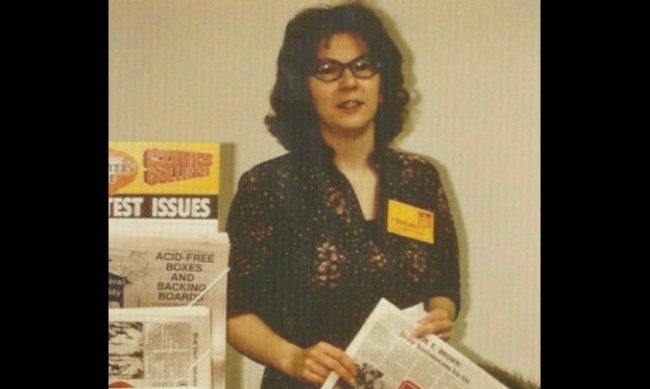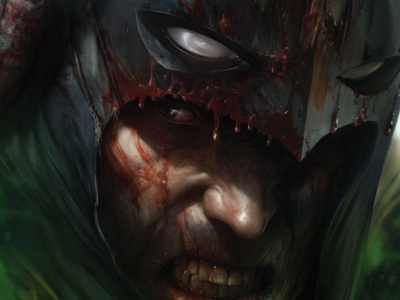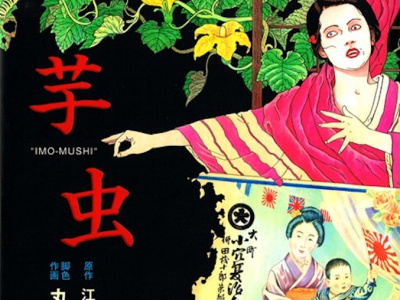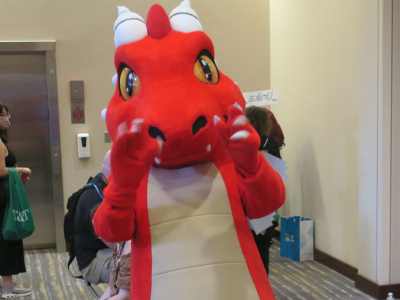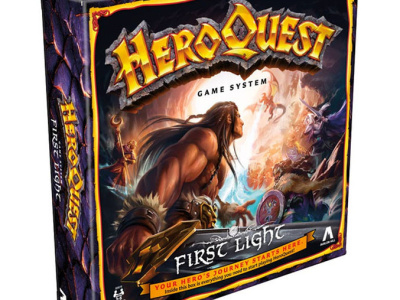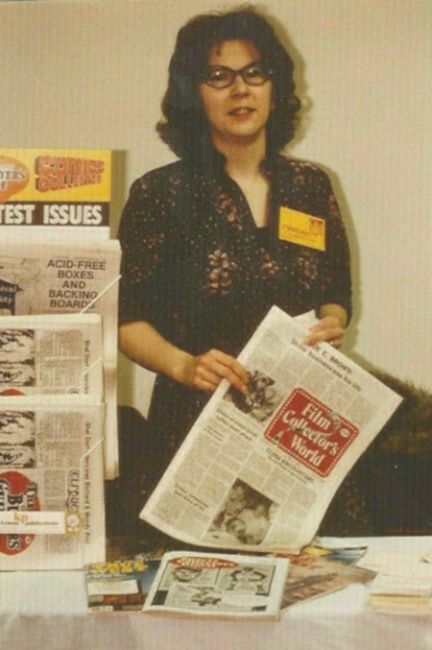
Maggie Thompson, likely in the mid-80s, while working for the Krause Publications 'Comic Buyer's Guide.'
This interview was conducted as part of ICv2's Comics Direct Market 50th Anniversary celebration; for more, see "Comics Direct Market 50th Anniversary."
To watch a video of this interview, see "ICv2 Video Interview: Maggie Thompson, Part 1."
What was your first fandom?
Science fiction. My mom was a science fiction writer you've never heard of, as I believe Wikipedia points out.
Yes, it does. Yes.
Betsy Curtis, so I grew up surrounded by science fiction. She was an English major. She graduated cum laude, blah de blah de blah.
My first World Science Fiction convention was—I was 12. I was surrounded by people who wrote professionally, who drew professionally, who edited, etc. I was familiar with that world, which also was the world that my mom and dad got me into, in terms of bonding with Walt Kelly, who had done a story for a comic book I bought before I could read. Mom read it to me and liked the story so much she showed my dad. He liked it. They wrote to Walt Kelly because they knew, thanks to science fiction, they knew here's how you contact someone whose work you like.
That started a correspondence that basically led to my career.
How did it lead to your career?
I learned that with a comic book, if you didn't buy what you liked, you wouldn't find it the next month. You buy what you like, then if you don't take care of it you can't go to the library and read it next month, so you have to keep it. You have to keep it in good shape. You have to organize it so you can find it, etc.
Then, you say, "Thank you," to the people who give you pleasure. Because Mom and Dad were in science fiction fandom and were doing fanzines, I learned about doing fanzines. Then I met this guy at a science fiction picnic. He'd hitchhiked there. He was a member of the National Fantasy Fan Federation. Science Fiction writer Basil Wells had invited a bunch of pros and fans, anybody who wanted to could come. This guy came. Andre Norton was there. Ed Hamilton and Leigh Brackett were there. Basil Wells was holding the picnic. This Don Thompson guy hitched on up. We gave him a ride halfway to his home. Then we started corresponding.
I think the first thing, the first contact that we made after that was when Humbug came out. Don folded it in half, put it in a number 10 envelope, and sent it to me and said, "Maybe you didn't see this." We started corresponding about comics, science fiction, fantasy, mysteries, pop culture. We didn't have a television, Mom and Dad didn't, but we did have radio and so forth and so on.
I guess Don kind of slid into your mentions, as they put it.
Absolutely. As we say.
I'm fascinated by this whole period of science fiction morphing into comics fandom. I don't think enough has really been said about it or examined about those years. Where was this? Where did you grow up?
I was born in Ithica, New York, which is where Cornell is, which was where Dad was a grad student. Then we moved to western Pennsylvania, where Dad taught at Allegheny College. From fifth grade through high school, I went to Sangertown Area High School, which was a rural high school in Pennsylvania.
There were science fiction picnics. Mom and Dad visited Ed Hamilton and Leigh Brackett every summer. I remember being in his office and looking up and saying, "Why are the comic books here?" He said, "Well, I write them." That kind of thing.
In 1960, at the World Science Fiction Convention, Dick and Pat Lupoff came to the costume competition as Fawcett Comics’ Captain and Mary Marvel. Don and I were part, by the way, of the family group that won best costume for a family group. Mom was a master costumer in addition to her other stuff. We went as the Five Fanner Senses and it included Don, who I was going with at that point. Dad was sense of science. He wore his doctor's gown and he handed out science formulas. Mom was extra sense, so she wore a cloaked hat and handed out fortunes. My sister, Mary, was sense of humor, so she had a third leg in a bikini—a bikini, right!—a propeller beanie. A sense of humor.
A propeller bikini. That would be even better.
Yeah, that would have been an interesting concept. That was not it, however. She was young. I was sense of wonder. I had bright red hair and diamonds and wore a strapless gown, and clown white. It was things like I wonder how a spaceship can fly when there's no air to push against that kind of thing. Then Don had a tabard that my mother had worn where she used beer bottle caps front and back and the covers of science fiction magazines front and back. Don was 35 to 50 cents, which was the price of a science fiction magazine.
Now there are photos of this, right?
Oops. The next night, however, we're at the banquet and we're with Bill Thailing and Hal Lynch and various others and we go, "OK, we know science fiction. We know all about the science fiction stuff, but they came as Captain and Mary Marvel. What about comic books? Who writes them? Who draws them? Who edits them? How do you contact them? Maybe we should start a magazine, a fanzine to find out more about comics because Walt Disney does not write and draw the comic books that carry his name." That's where that started.
You still didn't tell me. Where was the picnic where you met Don?
Basil Wells's place. I think it was Beaver Falls, Pennsylvania.
Pennsylvania. Wow. Interesting.
Western Pennsylvania. He came from the area Titusville, with the first oil well.
I actually spent a few years of my early life in Bucks County, but we always went back. I spent a lot of time in the kind of that area of Pennsylvania, so I do know Titusville, as a matter of fact, yes.
It was in the oxymoronically named Grand Valley as he said. Yes.
Interesting. What was the attitude of the science fiction—let me back up a little bit because obviously there was a strong element of science fiction fans being outcasts, or outsiders, let's say outsiders from society.
We thought we were insiders. I'm just saying, we thought we were insiders, because we were, face it.
You were.
We belong to the future.
There was a strong element of any kind of fandom being looked down upon, I think, at this time. Or am I wrong? There's a lot of misconceptions about that.
We never felt it and we sneered at the people who sneered at us. Isn't that the way life goes? "You don't know the real story. I'll tell you the real story. My books were started in—" and then everybody's eyes roll up and then they don't care. By the way, many of the science fiction fans sneered at the comics fans.
That's what I'm getting at.
Absolutely.
I interviewed Trina, not that long ago. She also got started in science fiction fandom, in New York. It seems like a lot of people were, like I said, spun off. What was your impression of comics fandom? Obviously, you and Don were getting into it, but how was this sneering from the "establishment" of science fiction, how was that expressed or shown?
There was the in group that knew how good comics were, as opposed to the ignorant. If you're ignorant, if you don't know anything about something, then you sneer at it and go, "Oh, golly." The person who knows something about anything that they care about, whether it's hip hop or whatever, they know things you don't know. So there is that aspect of it.
There is also the aspect that some of the professional science fiction writers sort of felt they were slumming if they were doing comic books. They weren't being paid as much. Then on the other hand, let's remember that John Campbell did an editorial in which he said, "Look you people who think that you're going to get your rent money from selling to Astounding Stories, forget it." He said, "That's that camera you wanted to buy. That's a vacation trip you wanted to take. I am not paying your rent." It was all a sideline, if you will.
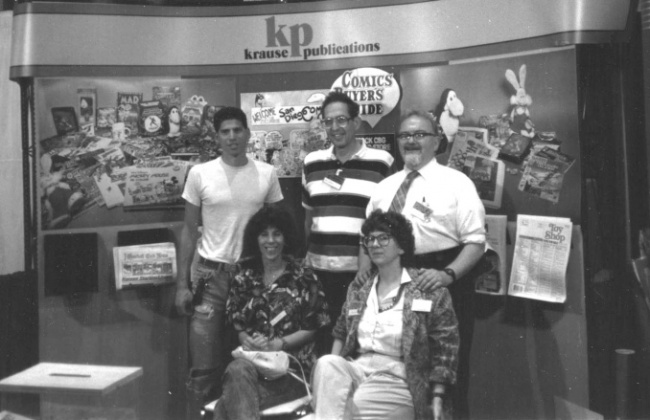
Caption: At a San Diego Comic-Con, ca. 1989, standing, left to right: Ken Lupoff, Dick Lupoff, Don Thompson. Seated, left to right: Pat Lupoff, Maggie Thompson.
Out of how many people?
Ooh.
Hundreds?
No. Maybe a hundred. It was small.
It was four percent. That's still about the five percent level that everybody said.
Nice way of putting it.
Stan Lee didn't come. Flo Steinberg came. Let's point that out. Leonard Darvin of the Comics Code came and debated Don about the Comics Code, etc. Comics pros were there. It was a wonderful event, but my feeling was a lot of the attendees were like teenage boys about up to my shoulder. There's that. That’s my reverse perception.
I don't know if you were at the Pro Con where Will Eisner gave a talk. He said something that stuck with me the whole time, which was as long as young boys doubt their masculinity, there will be a need for superheroes.
Let's apply it to all children. The women can take control. I know, I know.
Was Paul Levitz there?
Paul? Ask Paul.
Oh, the other thing that happened was, so we did Comic Art, which was the first general fanzine about comics in general. It was animated cartoons. It was magazine cartoons. It was comic books, comic strips, the gamut of comic art. As per our name, Comic Art.
Per the name of the other amateur magazine that started at almost exactly the same time, the title of that fanzine was Alter Ego, which says super characters. You have a secret identity, and then you're the reporter who changes into a costume and fights crime.
Now, that's two different audiences, if you come right down to it. It wasn't that we didn't enjoy that, it was part of the larger world, we felt, which was comics in general. I think you would find less sneering of people in general if you said, "Oh, we're also talking about the New Yorker. We're also talking about what you're reading in the newspaper. Are you clipping the strips? Are you putting them on your refrigerator? What about the political cartoons? How are those?" etc. Our interest was always broader. However, All in Color for a Dime, which was the articles that ran in Xero, by Dick and Pat Lupoff, those were nostalgic articles about, again, superhero characters.
There was that semi-dichotomy that wasn't a true dichotomy.
Let me go back though just a little bit. I want to try to get a little bit of the thread of the fanzines. What was the first fanzine that you did? What was the first fanzine you were involved with?
We did a one sheet called Harbinger, which basically said, "Hi, this is to tell you we're going to do an amateur magazine about comic books. Do you want it? You want to subscribe? Can you do articles for us? Let's find out more about comic books." Technically that preceded the others, said, "Please let us know." Then we did Comic Art #1, Comic Art #2, blah, blah, blah. By 1968, we were up to Comic Art #7 with 450 copies, I see from my notes.
You were doing this with Don. You and Don, I assume by then were married. What were you doing first?
The first issues we were just going together.
But you were a couple?
He lived in Cleveland. I lived in Oberlin going to Oberlin College. He would come down on the weekends. We would hang out. He would go back to Cleveland to work at the Cleveland Press.
Now, the Oberlin college had, what did they call it? Something like their recreational dorm or something like that. They had a mimeograph machine there, and guess what? A mimeograph machine, it could publish a fanzine. Then after we got married, we bought our own mimeograph machine, just saying, here we are.
You were both college students when you started this?
No. When we met, he was a sophomore at Penn State and I was still in high school.
They don't like that kind of thing now.
Dark Horse, when they did that little encyclopedia of comics, I was told that their lawyers circled that and went, "Is that a legal problem?" We were just corresponding for the first two. He would come and visit. We would talk about comic books and old-time radio and whatever, because we were friends.
Who else could I talk to about listening to the Jack Benny show, or going to Invasion from Mars, or the various things? He was a fan of my mother's. He liked my mom's stories. He started, interestingly, as a comics reader. When EC put Ray Bradbury's name on the cover of his science fiction comic book, and then he saw a science fiction magazine with Ray Bradbury's name on the cover, he said, "Wait a minute" and got into science fiction that way. He actually came into science fiction from comics. Footnote that nobody cares about.
I guess what I'm trying to get at is what did you think you were going to do for a living at this point? What were your career plans, your aspirational plans? Because doing a fanzine, I'm sure seemed like just a hobby, a pastime at that point.
Of course it was a hobby. Nobody can make a living doing a fanzine.
Of course.
In college, my senior year in college, I was an English major; but because it was a liberal arts college, you couldn't just obsess on whatever your major was, so I had to find all the English courses that weren't technically in the English department.
I took teaching children to read and children's literature and so forth and so on. I parlayed that into, when I graduated, a job as a pre-professional assistant children's librarian in Cleveland. Our first summer we were married, we lived in his apartment in Cleveland. Then we moved to Oberlin for the rest of my college, the next two years, moved back to Cleveland, same apartment building. He continued to work at the Cleveland Press. I went to work at the East 79th Street branch library in Cleveland.
I got to meet cool people there. I got to meet Munro Leaf, I got to meet Lloyd Alexander, etc., etc., etc.
Wait. Who was the first person you got to meet? You just said you got to meet Lloyd Alexander.
Munro Leaf, who did The Watchbird in one of the women's magazines. "This is a watchbird watching a phone hogger." "This is a watchbird watching you." They were stick figures. It was wonderful.
He did things like History Can Be Fun, Arithmetic Can Be Fun, Geography Can Be Fun. It was all stick figures. He did a book and author lecture for the library. I went to it, and his message to the grade school children of Cleveland was, "People tell you you can't do something because you're not good enough." He said, "Look how terrible my art is. I make a living. I make a living from it."
My question for him concerned a book he had done that was in the library that I had read in our collection for the first time, which was called Sam and the Superdroop. It was an attack on comic books in the 1940s that he had written. The interesting thing about it is Sam thinks that comic books are great. He rides on the Superdroop, blah, blah, blah, and the whole point is the books are better than the comic books. "You don't understand. You need to read books, not stupid comic books." It was very knowledgeably done.
I went up to him after his lecture and I said, "You know what you're talking about when you're attacking comic books." He went, "Yeah." He said, "My sons loved it when I did that because I bought stacks of comic books as research material, and they read them and loved them."
Were you aware of 1954 and Frederick Wertham? Were you aware that there had been this anti-comic book crusade in the '50s?
75 years ago this year was the attack on comic books. Yes, of course, and my mother actually would tell people, "No, you don't understand. These are really good. And you really should share them with your children." In fact, she was telling her friends in her fanzine, by the way, "Read comic books because they're really good. If you're dismissing them, you're missing a bet."
I think what's interesting, just about this whole Direct Market 50‑year Anniversary project that Milton is doing is that this is a period pre‑Internet. It hasn't been examined too much in the light of today's slant on things. This group that you were with in the late 60s did expand, and I'm sure Phil Seuling came out of it and there were these conventions in New York. I'm assuming this John Benson convention was in New York, right?
New York City, and Benson was a science fiction fan.
I remember he wrote for The Comics Journal too. It never fails to astound me when I tell people that Gary Groth and Paul Levitz were in a fanzine together and Frank Miller was in one too with them. These roots go back very, very deep.
Absolutely. The other thing was that we were functioning in almost complete ignorance, which we were trying to inform. One of our projects was in 1968, in March, we published a listing of Dell special series comic books and a few others. It wasn't until 1968 that we had managed to compile an almost complete listing of the Dell Four Color series. In fact, Bob Overstreet got his listing from us. In every issue, we'd say, "We still don't know what the titles are that go with these Dell numbers," and we compiled it.
How did you do that without the Internet?
In every issue of Comic Art, we said, "We are still missing the information for this." Obviously, we looked, wherever we could find used comic books, we would check for the Dell Four Color numbers, and eventually people supplied them.
Wow. The heroic nature of these early cataloging projects is astonishing. You did how many issues of Comic Art?
Seven. It was always published on an irregular basis, so number eight is not late yet.
That was, what did I say it was? 1968, yeah.
What was the next publishing project that you worked on after Comic Art?
Simultaneous with Comic Art, we did the Comic Art comic fan awards, and then we started Newfangles. That was a definite imitation of FANAC, which was a science fiction newsletter. Our thing was, we don't care so much about the professional news, but how about the fans? How are they doing? Are they getting married? Are they doing changes of address? How do we stay in touch? Again, keeping people in touch with each other in a group that basically was, it was kind of international, but we were spread out. We would say, "So and so got married. So and so moved. Hey, did you know this and that and the other? Here's reviews of some comics that you might have missed." That sort of thing.
Then people started feeding us news. My favorite was the issue that we did, "How to Squash a Rumor," which was that we had been told that Stan had been fired from Marvel for hiring his relatives and had gone to work, I think it was that he had gone to work for Charlton and was working with Steve Ditko again, I think was the rumor.
We said, "What are we going to do about this?" Mind you, this was back in the pre‑cell phone days. I had to pay a toll call to call the Marvel offices. Stan Lee picked up the phone, which seemed to solve that question right there.
Wow, so you just called Marvel and Stan picked up the phone. You said, "Did you get fired?" And he said, "No, true believer!"
I said, "I think we've got the answer to the question I was going to ask." That was our cover story. We did a special issue that just said, "No, Stan isn't fired."
When you say special issue, how many pages was it?
All we ever sent was one sheet. Two sides, one sheet.
Was that for Newfangles?
That was Newfangles. It went to more pages.
How often [was it published]?
Monthly.
It would be like, again, the equivalent of a newsletter, an emailed newsletter, except it just came out once a month because the work involved in gathering the news was so...
It was a pain in the butt, plus our circulation kept growing. As the number of pages grew or whatever, then we had to address it, stamp it, etc. It was consuming more and more time. What happened was, this was in the middle of the night one night and we suddenly realized, in order to send it out in time, we were sitting across from each other at a card table. I was doing the address labels on the thing. Don was putting the stamps on. This was back in the days when you had to lick the stamp. He does the lick a stamp, stick it down. Lick the stamp, stick it down, and so forth in the roll of stamps.
Well, the roll of stamps had fallen over his leg. One of our cats thought that was very attractive and with all claws out, in his thigh—crunch! Sitting about as far away as I am from my computer here, he screamed in my face and we said, "We're too old for this. We can't keep doing this. This is too much of a pain in the butt. So, let us be an example to these kids."
We were kind of like the grown‑ups. Jerry Bails and Roy Thomas were our age, but generally speaking most of the comics folks were kids. Teens.
What year was this, though?
This was 1971.
You would say you were too old for this. You were 29, 28, something like that.
'71.
Anyway, we said, "We can't." We had kids. We had a kid, not kids.
You had Valerie at that point?
Actually, let me work this out. Yeah. Valerie was born in 1967, so yes, Valerie was born. Steven was not yet born.
When was Steven born?
1972.
This is back a ways, about midsummer is when this happened, the stamp thing. We said, "There are all these kids who run off with everybody's sticky quarters." Because that's how you'd subscribe, you'd Scotch tape a bunch of quarters into your letter and send them. Kids were walking off with sticky quarters and never providing what they'd been promised as a subscription. So let's be an example to the kids. Talk about a swelled head, right? Here's our example to the kids. It's midsummer, we are going to announce to everyone that the December 1971 issue of Newfangles, #54, will be our last issue. We refunded the money to anyone who paid past that, and then we said, you have this number of copies left, do not subscribe past this number, you can only subscribe to here. Giving someone else a chance to start a newsletter to replace Newfangles.
Very good. Yes.
A couple of kids came along and did that.
Who were those kids?
One of them was Paul Levitz, who at one point said he owed his job to us. It was like, "Yeah, sure." No, he and Kupperberg did a fanzine called Etcetera. It looked good. I said, "OK, guys, start subscribing to Etcetera."
So that was it. We weren't going to do it anymore. In the meantime, Alan Light had said, "Look, you don't like to do the mailing. You don't want to handle the subscriptions or whatever. How about if I publish it and take that off your back and you just provide the content?" We said, "Get lost kid." He was taking the money he earned mowing lawns or something.
We'll see. Let me back up just a little bit. Alan Light. You're saying he was a high school kid at this point, right?
I think he graduated, but he saved his money and he said this is something he'd like to do.
What was he doing at that time? Who was Alan Light? Nobody now knows who Alan Light was.
That's a shame. He was wonderful. An entrepreneurial high school kid who I believe, yeah, I think he’d graduated at that point and was looking for something to do and guess what? He did it.
Click here for Part 2.



